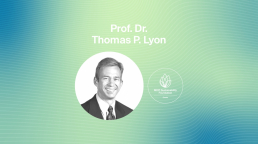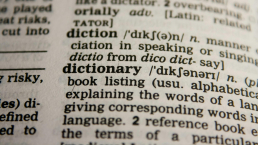
Looking at 2023 Sustainability Awardee Prof Tom Lyon’s Research
Due to his outstanding work in the field of economics and corporate sustainability, Prof Tom Lyon has been awarded second place in the 2023 World Sustainability Awards. In this article, we’ll elaborate on how Prof Lyon’s research and consulting work has helped to advance the Sustainable Development Goals in the context of economics.
The awards ceremony for the 2023 World Sustainability Awards will take place on 14th September 2023 during the 10th World Sustainability Forum. At the event, you’ll be able to hear Prof Lyon speak on the work he’s doing to increase corporate social and political responsibility.
Here, we’ll be looking at the impact of Prof Tom Lyon’s work at the intersection of economic activity and environmental sustainability.
Prof Lyon is placing sustainability in economics
Prof Lyon holds the Dow Chair of Sustainable Science, Technology and Commerce, and has appointments in both the Ross School of Business and the School of Environment and Sustainability. His teaching experience covers topics including environmental governance, business strategy, and managing innovation.
He has also consulted and worked as an expert witness for several organisations. Importantly, he is sought out for being a “leader in using economic analysis to understand corporate environmental strategy and how it is shaped by emerging government regulations, non-governmental organisations, and consumer demands”.
This speaks to why he was selected for the World Sustainability Award, which recognises the “novelty and feasibility of real-life applications” and “entrepreneurial potential” of research.
Corporate responsibility
Prof Lyon’s research is based on case studies that are supported by economic theory and theories of political behaviour. This is the approach taken in his book Corporate Environmentalism and Public Policy.
This landmark book was the first economic analysis of ‘corporate environmentalism’. This term refers to environmentally friendly measures that are not required by law. However, he argues they mainly occur because businesses seek to anticipate government policy changes and influence law-making to secure their best interests.
From this, he argues for and presents a new framework for understanding the interplay between corporate strategy and public policy.
Encouraging sustainable economics
Building on his research on corporate environmentalism, Prof Lyon writes about the positive potential of this “self-regulation as a way to pre-empt government regulation”. For example, if a firm invests in a technology with an upper limit on pollution control capability, they’ll have to scrap that technology and adopt a new one if new standards are implemented. In this case, he incentivises pre-empting the mandated change by adopting technology with higher pollution control capabilities. This strategy can help to both save money in the long term and reduce pollution.
Thus, pre-emption can be used positively and negatively. But how might we judge a corporation’s intentions?
How Prof Lyon outlines greenwashing
In his paper ‘The Means and Ends of Greenwash’, Prof Lyon aimed to capture a “more precise definition of greenwash [that] would help focus future research”. However, his research led him to “a very different view: greenwash is an umbrella term for a whole family of behaviours”.
He defines greenwash simply as “communication that misleads people into forming overly positive beliefs about an organization’s environmental practices or products”. He identifies it from the perspective of different disciplines:
- Organisation Theory: He refers to when there is a disconnect between the structures and activities of an organisation. For example, a company may have a sustainability team yet invest in fossil fuel production.
- Game Theoretic Economics: This refers to interactions between parties, often with asymmetric levels of information. For example, a company may invest resources into distorting consumers’ ideas of a product’s quality.
- Marketing: Laws about deceptive marketing crucially depend on how individuals interpret particular claims. Thus, “greenwash is truly in the eye of the beholder” in advertising.
This work has helped to expand the “taxonomy of greenwash”, measure the prevalence of its different manifestations, and theorise and identify its impacts more broadly.
Complicated landscape of sustainability
Prof Lyon’s research into greenwashing is essentially focused on making sense of the dissonance between how corporations present themselves and their actions.
The World Sustainability Award looks for researchers who work between the Sustainability Pillars. Evidently, Prof Lyon is at the intersection of all three: environmental, social, and economic. His work gives stakeholders more knowledge about greenwashing, thus increasing the pressure on corporations to be honest about their goals. Importantly, he does this while considering their economic aims.
Corporate responsibility
Corporate Social Responsibility (CSR) is a “management concept whereby companies integrate social and environmental concerns in their business operations and interactions with their stakeholders”. Prof Lyon highlights how CSR “has gone mainstream”: of the Fortune 500 global companies, four-fifths of them now issue sustainability reports.
This is a positive sign, but, as Prof Lyon’s greenwashing research highlights, the surface often deceives.
For example, he highlights how multiple CEOs of some of the US’s largest firms signed an open letter to The Wall Street Journal urging the US to remain in the Paris Agreement, which sets out a global framework to mitigate global warming. Simultaneously, they were supporting a lobbying group that was pushing the Administration to withdraw from the Agreement.
Implementing Corporate Political Responsibility
As such, he calls for Corporate Political Responsibility (CPR). This means corporations must support the larger political systems we all depend on. Otherwise, CSR is a “public relations gimmick” that is undermined by political actions in the background.
In his article, ‘CSR Needs CPR’, he provides three suggestions for companies:
- “First, fully disclose your corporate political activity.”
- “Second, align your political activity with your public pronouncements and CSR efforts.”
- “Third, support public policies that will enable the private sector to better pursue sustainability efforts and commitments.”
Putting it into practice
Currently, as the Faculty Director of the Erb Institute of the University of Michigan, Prof Lyon plays a key role in the CPR Taskforce (CPRT), which aims to “create a sustainable world through the power of business”.
The members of the taskforce research CPR and collaborate with businesses to help them align their approach to political influence with their purpose, values, and commitments. Jointly, the taskforce “wrestled with different views, and gradually found a thought process based on common ground”. As such, they “approach CPR as a journey” that includes reflection and action.
Here is a brief outline of their process:
- Legitimacy: Defining whether the firm should engage with an issue and determining what is right.
- Accountability: Striving for alignment with their commitments to purpose, values, stated goals, and stakeholders.
- Responsibility: Demonstrating active support for the systems on which the economy, society, and life depend.
- Transparency: Communicating openly and honestly about their political activities.
The World Sustainability Award looks for “novel, innovative, and real-life applications”. Prof Lyon’s research and work within the taskforce are contributing towards the development of a transparent and sustainable business landscape by working with, rather than for or against, corporations. This realistic and collaborative approach addresses SDG 8, which aims to “promote sustained, inclusive and sustainable economic growth”.
Prof Lyon is leading sustainability
Prof Lyon’s research demonstrates his commitment to advancing sustainability and doing so by researching at the intersection of economic activity and environmental sustainability. This works because he looks to implement his research that benefits corporations, their stakeholders, and the planet.
Prof Lyon’s research will continue to adapt to the ever-changing economic landscape for application to help governments, corporations, and individuals embrace sustainability.
World Sustainability Forum 2023
Prof Lyon will be speaking about his work directly during the Award Ceremony, which will be held on 14 September 2023 during the 10th World Sustainability Forum (WSF2023).
WSF2023 is a 24-hour hybrid event taking place in Singapore, Basel, and Toronto. You can learn more about WSF here. The Ceremony will be held in the Basel Hub in Switzerland. Those of you wishing to attend the Award Ceremony and to hear Prof Lyon speak about his work can do so by registering for the WSF2023.











Intersting naration of Professit Lyon’s work